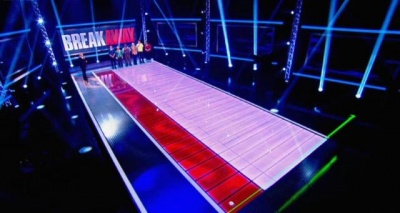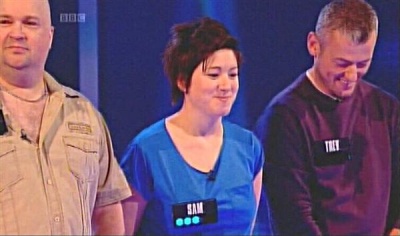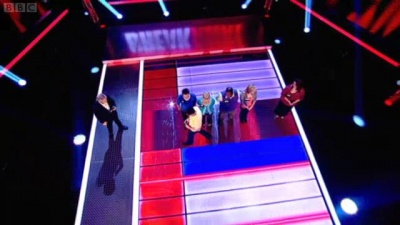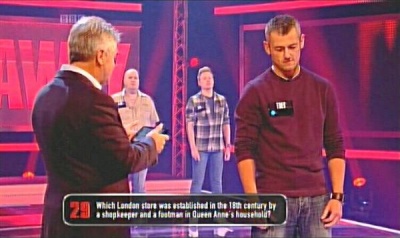Weaver's Week 2012-04-15
Last week | Weaver's Week Index | Next week
In the "name a game show after a foodstuff" competition, Keith Lemon's Lemon Aid was disqualified for managing not to incorporate any game show elements into a light entertainment format. Nor did it incorporate any entertainment elements into a light entertainment format. So the prize goes to the original runner-up.
Contents |
Breakaway
BBC2, 12 March – 6 April
Having dispatched The Weakest Link with an affectionate, "bye, then" last week, what does BBC2 have in the locker to replace it? The newest show on the block is Breakaway, starring a 100-foot LED carpet. This is a massive undertaking: it's one of the largest indoor sets ever made, almost 50% larger than The Whole 19 Yards, and entirely carpeted by multi-colour diodes and lights.
At one end of the carpet is a thin green line, the finish line that will allow whoever steps through it to claim the prizes. At the other end, Nick Hancock allows six contestants to briefly introduce themselves.
To win Breakaway, the team will have to provide correct answers to 30 questions. The first 21 answers will come from seven categories, the last nine will be general knowledge stumpers. The players will work as a team, with one of them stepping forward to give the collective answer. There's £100 for each correct answer, but if a player gives a wrong answer, then all the money won in the game so far is lost, and they start a new chain from zero. Whatever money is in the pot when they step through the finish line is split between them.
All of this is well and good, but a prize possibly as high as £500 is hardly going to set the pulses racing. So there's a chance to do something a bit more interesting. Over on the side of the carpet is the breakaway section. A player who chooses to head over here must answer alone, without the benefit of their teammates. There's a chance of untold riches – well, a few thousand quid – as each question is now for £300. But one wrong answer means that the player risks losing their place in the game, and they could leave with nothing.
To avoid this fate, Breakaway has a system of lives, denoted very niftily, by little lights on the player's name badges. Each life represents a wrong answer for someone on the breakaway track: rather than stepping away from the game, they can merely step back and try again. Five lives will be awarded during the game, all of the form "Who, what, or where is this?" First player to buzz in with the correct answer gets the life. And, just to add to the back-stabbery, players are able to choose to steal a life from someone else, or to bring a new life into the game.
All five lives are awarded early in the game, as the player who answered the life question correctly also gets to choose the next category of play. They can confer with the rest of the team, if there's a category everyone's unsure about it makes sense to get rid of it early. But this may be a double-edged sword, because after the category has been chosen, there's an opportunity for a player to move across to the breakaway side.
And so it goes on: a life question, choose a category, ask if anyone wants to break away, then three correct answers from that category.
The important question thus becomes: when, if ever, is the right time to break away? Crucially, only one person can choose to break away from the team at each opportunity. If there's someone on the breakaway side, the team isn't asked if they'd like to join in. Instead, a solo escapee has the option (but not the obligation) to invite someone across: the person invited can, and often does, refuse the request.
When a breakaway gets a question right, £300 goes to the prize pot. When a solo breakaway gets a question wrong, that player will lose a life, or their place in the game. When a two-player breakaway gives an incorrect answer, the other players on the main track have a decision as to which player to penalise. Will they remove one of two lives from Bill, or sling lifeless Ben out of the game? Once a breakaway is over, the rest of the team moves forward to take their place on the track, and they inherit the prize fund. But remember, one wrong answer and it'll diminish to nothing. And if the breakaway doesn't end, only those on the breakaway track will win money.
Nick Hancock hosts the show, his first major engagement since ITV primetime show Duel some years back. Apart from his hair colour – now rivalling Phillip Schofield as Television's Silver Fox – very little has changed. Hancock remains a little bit cheeky, but in a gentle style, laughing with and at the contestants in the same breath. It's a spectacular feat when done this well. He reads questions from an electronic gizmo, which doesn't suffer from breakdowns or failures. The advantages of taped television, there.
But the main thrust of Breakaway is the psychology. When is the right time to go? There's a potential £10,000 to be won – if someone decides to break at the start of the game, Nick will throw in a bonus of £1000. The possible prize diminishes quickly, £600 for each category cleared in three questions, more if the team breaks the chain of correct answers. Can a breakaway after four, five categories succeed? Will the escapee be able to convince someone to join them? Will the escapee want someone to join them?
Other commentators have suggested that the first twenty minutes of the show can be skipped without losing much. This tends to be true, it's usually just a parade of knocking off questions and awarding lives. It passes in a genteel, almost courteous, manner. But this is where the team's getting to know each other, work out their collective strengths and weaknesses. If someone knows they're not the strongest link, but the best player seems a little cautious, they might be tempted to break sooner than later. Even so, we wouldn't mind seeing a week of shows in a 30-minute format, perhaps requiring 20 correct answers.
The great thing about Breakaway is that it's so completely unpredictable. We've seen episodes where people break away right at the start, and are gone before the first category's done. We've seen episodes where people break at the start, and invite a succession of people across, before the chasing pack finally inherits many thousands at question 27. We've seen episodes where the players worked as a team for £125 each, and ones where everyone was too greedy and left with nothing. When we tune in at 4.50, we never know what we're walking into.
Mastermind
Second Round, Match 4
"To be honest we're just amazed it's in the same slot for two weeks running", wrote Creamguide of this week's Mastermind. That's except for viewers in Scotland; this episode went out across the nation at 8pm. And maybe that's why they're holding off the final: they want it to go out in a week when there's no rugby to disrupt things.
Chris Cummins is first amongst us, taking the US Masters, as in the golf tournament held at Augusta National course. Founded as the Augusta National Invitation Tournament in 1934, the tournament's played in the first full week of April, and awards a green jacket to its winners. Women aren't allowed to join the club, and blacks were disqualified until far too recently. The round starts strongly, falls away in the middle, and picks up again towards the end. 9 (2) feels like a bogey round. More Fore!: last year's highlights*.
Mike Clark has been reading Philip Pullman's His Dark Materials trilogy (1997-2000). A complex, high-fantasy trilogy, Pullman's world of dust and timepieces refuses to be bound by the conventions of good and evil, and doesn't bother much with exposition. It's an intricate world, making allusions to science and religion and philosophy. The round gets off to a bad start, forgetting the Oxford college, but quickly recovers to 10 (0). More darkness: all three books*.
John Marshall will tell us about Clyde River Steamers 1890-1960. The heyday of steam-powered boats in Glasgow was in the 1920s and 1930s, before diesel engines became cheap and reliable. These days, there's the Waverley and – following cancellation of the Anne Robinson last month – that's about it. The final answer sounds like "Do you know?", but it's actually "Juno". 12 (0).
Paul Smith has the night's biggie, Classical Mythology. In the beginning, there was Chaos. Then came Gaea and Uranus, whose sons sniggered when they pronounced his name like schoolboys. Cronos and Zeus followed, then Zeus waged war and ended up ruling over the earth. Most of the rest of the pantheon are both friends and offspring of Zeus. 9 (1). More smiting: A Short Introduction*.
Last up is Andy Tucker, taking the East African campaign of World War I (primarily 1914-7). German East Africa was Burundi, Rwanda, and Tanganyika; the British controlled Kenya to the north and the island of Zanzibar. Both sides saw the other as a legitimate military target, with the British taking Lakes Victoria and Tanganyika, and the rest of the mainland after being reinforced by troops from the Belgian Congo. 11 (0).
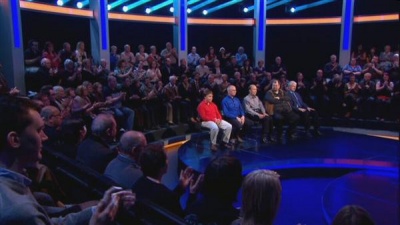 This week's contenders nestle in the security of the Salford studio. The Hare is keeping troublemakers well away.
This week's contenders nestle in the security of the Salford studio. The Hare is keeping troublemakers well away.
Please don't tempt fate by suggesting another play-off, Humpho. Chris Cummins got here on 24 February, when he had the television career of Victoria Wood. There are correct answers, but there are wrong answers and passes, and 21 (3) doesn't quite feel like a winning score.
Paul Smith is one of two high-scoring losers in this programme: he took Aircraft of World War II on 2 December. Like Mr. Cummins, Mr. Smith tries to answer a question when it sounds like it's finished, but the writers have gone on and on and on. All of which restricts the contender's score to 17 (4).
Mike Clark won on 16 March taking "Seinfeld". There's a long pause on the third question, and he gets it wrong, and that seems to sap some of his confidence. Unlike the host, the contender doesn't remember when Britannica was split into Britannica Superior (capital Londinium) and Inferior (capital at Eborarcum). 20 (0).
Andy Tucker won the very first show of the series: Robert Bruce Lockhart brought him victory on 4 November last year. He knows about blackcurrant, Casanova, and the Commissioner of the Metropolitan Police. Linking these two answers, we didn't realise that the next London Mayor would become the capital's police commissioner. And then he mentions Danny Alexander. With a very strong general knowledge performance, the final score of 26 (0) throws down the gauntlet to all contenders.
John Marshall is the last tonight, he was runner-up on 25 November, when he took British speedway. He throws in a pass early in the round, ruling out the chance of a tie-break. The contender gives correct answers quickly, but he's dropping one or two questions, and this is going to the wire. In the event, he gets the last question wrong, to finish on 25 (4).
So Andy Tucker is into the final, and he's going to be a contender to watch. As are all his opponents.
This Week And Next
According to The Independent, ITV is casting about for a coffee maker. The small machine, which can turn raw beans into a caffeine-rich drink in no more than five minutes, will star on Messiah! alongside Andrew Lloyd Webber and a dozen wannabe Jesuses. An ITV press person told the tabloid, "It's prop placement rather than product placement", as the makers hadn't paid for the machine to appear, they'd just supplied it for free.
Faded pop star Paul Weller has put out a press release about televised talent shows. On the grounds that he's only doing it for the publicity, and hasn't done anything to interest us since about 1985, we're moving on.
Ratings for the week to 1 April show that Britain's Got Talent remains more popular than The Voice of Holland UK, by 10.35m to 9.95m viewers. The Apprentice is third, 7.5m, with Take Me Out (4.6m) beating In It to Win It (4.2m). The Apprentice You're Fired led on BBC2 with 2.55m, Just a Minute was seen by 1.5m on telly, and The Million Pound Drop picked up 1.65m viewers. ITV2 does a 1-2-3 on the digital tier: Celebrity Juice gets 2.46m, Britain's Got More Talent has 925,000, and the Sunday teatime repeat of Britain's Got Talent 845,000. That's ahead of The Voice of BBC3, 715,000 there.
A quiet week for new game shows: another edition of The Big Quiz (2) is scheduled for Sunday (8pm), but will it be more interesting than Chelsea vs Tottenham from Ashburton Grove? UKTV Dave is plugging Dara Ó Briain's School of Hard Sums (8pm Monday) really hard. The Voice of Holland UK moves into the second round with a double bill, 7pm Saturday and Sunday on BBC1.
Links marked with a * help support the UKGameshows servers.
To have Weaver's Week emailed to you on publication day, receive our exclusive TV roundup of the game shows in the week ahead, and chat to other ukgameshows.com readers, sign up to our Yahoo! Group.

